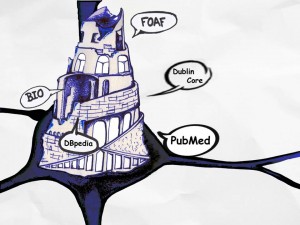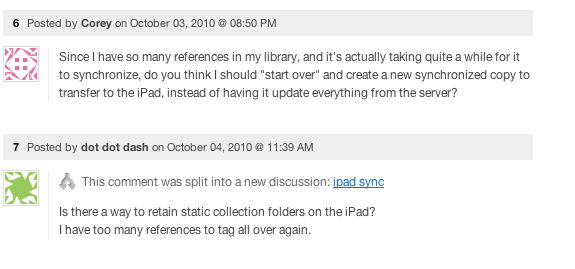We’ve extended the STLR 2011 deadline due to several requests; submissions are now due May 8th.
JCDL workshops are split over two half-days, and we are lucky enough to have *two* keynote speakers: Bernhard Haslhofer of the University of Vienna and Cathy Marshall of Microsoft Research.
Consider submitting!
CALL FOR PARTICIPATION
The 1st Workshop on Semantic Web Technologies for Libraries and Readers
STLR 2011
June 16 (PM) & 17 (AM) 2011
http://stlr2011.weebly.com/
Co-located with the ACM/IEEE Joint Conference on Digital Libraries (JCDL) 2011 Ottawa, Canada
While Semantic Web technologies are successfully being applied to library catalogs and digital libraries, the semantic enhancement of books and other electronic media is ripe for further exploration. Connections between envisioned and emerging scholarly objects (which are doubtless social and semantic) and the digital libraries in which these items will be housed, encountered, and explored have yet to be made and implemented. Likewise, mobile reading brings new opportunities for personalized, context-aware interactions between reader and material, enriched by information such as location, time of day and access history.
This full-day workshop, motivated by the idea that reading is mobile, interactive, social, and material, will be focused on semantically enhancing electronic media as well as on the mobile and social aspects of the Semantic Web for electronic media, libraries and their users. It aims to bring together practitioners and developers involved in semantically enhancing electronic media (including documents, books, research objects, multimedia materials and digital libraries) as well as academics researching more formal aspects of the interactions between such resources and their users. We also particularly invite entrepreneurs and developers interested in enhancing electronic media using Semantic Web technologies with a user-centered approach.
We invite the submission of papers, demonstrations and posters which describe implementations or original research that are related (but are not limited) to the following areas of interest:
- Strategies for semantic publishing (technical, social, and economic)
- Approaches for consuming semantic representations of digital documents and electronic media
- Open and shared semantic bookmarks and annotations for mobile and device-independent use
- User-centered approaches for semantically annotating reading lists and/or library catalogues
- Applications of Semantic Web technologies for building personal or context-aware media libraries
- Approaches for interacting with context-aware electronic media (e.g. location-aware storytelling, context-sensitive mobile applications, use of geolocation, personalization, etc.)
- Applications for media recommendations and filtering using Semantic Web technologies
- Applications integrating natural language processing with approaches for semantic annotation of reading materials
- Applications leveraging the interoperability of semantic annotations for aggregation and crowd-sourcing
- Approaches for discipline-specific or task-specific information sharing and collaboration
- Social semantic approaches for using, publishing, and filtering scholarly objects and personal electronic media
IMPORTANT DATES
*EXTENDED* Paper submission deadline: May 8th 2011
Acceptance notification: June 1st 2011
Camera-ready version: June 8th 2011
KEYNOTE SPEAKERS
PROGRAM COMMITTEE
Each submission will be independently reviewed by 2-3 program committee members.
- India Amos, Textist, Design Editor at Jubilat, USA
- Emmanuelle Bermes, Centre Pompidou Virtuel, France
- Mark Bernstein, Eastgate Systems Inc., USA
- Uldis Bojars, National Library of Latvia, Latvia
- Peter Brantley, Internet Archive, USA
- Dan Brickley, Vrije University Amsterdam, Netherlands
- Guillaume Cabanac, University of Toulouse, France
- Tyng-Ruey Chuang, Acamedia Sinica, Taiwan
- Paolo Ciccarese, Harvard Medical School, USA
- Tim Clark, Harvard Medical School, USA
- Liza Daly,Threepress Consulting Inc., USA
- Kai Eckert, Mannheim University Library, Germany
- Tudor Groza, University of Queensland, Australia
- Michael Hausenblas, DERI, National University of Ireland Galway, Ireland
- Antoine Isaac, Vrije University of Amsterdam, Netherlands
- Piotr Kowalczyk, Poland
- Brian O’Leary, Magellan Media Partners, USA
- Steve Pettifer, University of Manchester, UK
- Ryan Shaw, University of North Carolina, USA
- Ross Singer, Talis, USA
- William Waites, Open Knowledge Foundation, UK
- Rob Warren, University of Waterloo, Canada
ORGANIZING COMMITTEE
- Alison Callahan, Dept of Biology, Carleton University, Ottawa, Canada
- Dr. Michel Dumontier, Dept of Biology, Carleton University, Ottawa, Canada
- Jodi Schneider, DERI, NUI Galway, Ireland
- Dr. Lars Svensson, German National Library
SUBMISSION INSTRUCTIONS
Please use PDF format for all submissions. Semantically annotated versions of submissions, and submissions in novel digital formats, are encouraged and will be accepted in addition to a PDF version.
All submissions must adhere to the following page limits:
Full length papers: maximum 8 pages
Demonstrations: 2 pages
Posters: 1 page
Use the ACM template for formatting: http://www.acm.org/sigs/pubs/proceed/template.html
Submit using EasyChair: https://www.easychair.org/conferences/?conf=stlr2011




Time-based comments
I’ve been digging SoundCloud lately.
Today I noticed time-based comments in their tracks. It’s a bit disorienting to have comments pop up as you’re listening. Maybe after adjusting, there’s a pleasant sense of having a conversation going on around you. Definitely feels like you’ve got company!
Comments pop up as the track plays
Avatars appear below the track to indicate that there are comments, and you can scroll over avatars to read comments. You can also hide the comments if you prefer.
Entering a comment from the timeline
Avatar icons appear in the overview
Example track due to Duncan.
Tags: commenting, comments, SoundCloud, threaded discussions, time-based discussions, timelines
Posted in argumentative discussions, information ecosystem, PhD diary, social web | Comments (0)